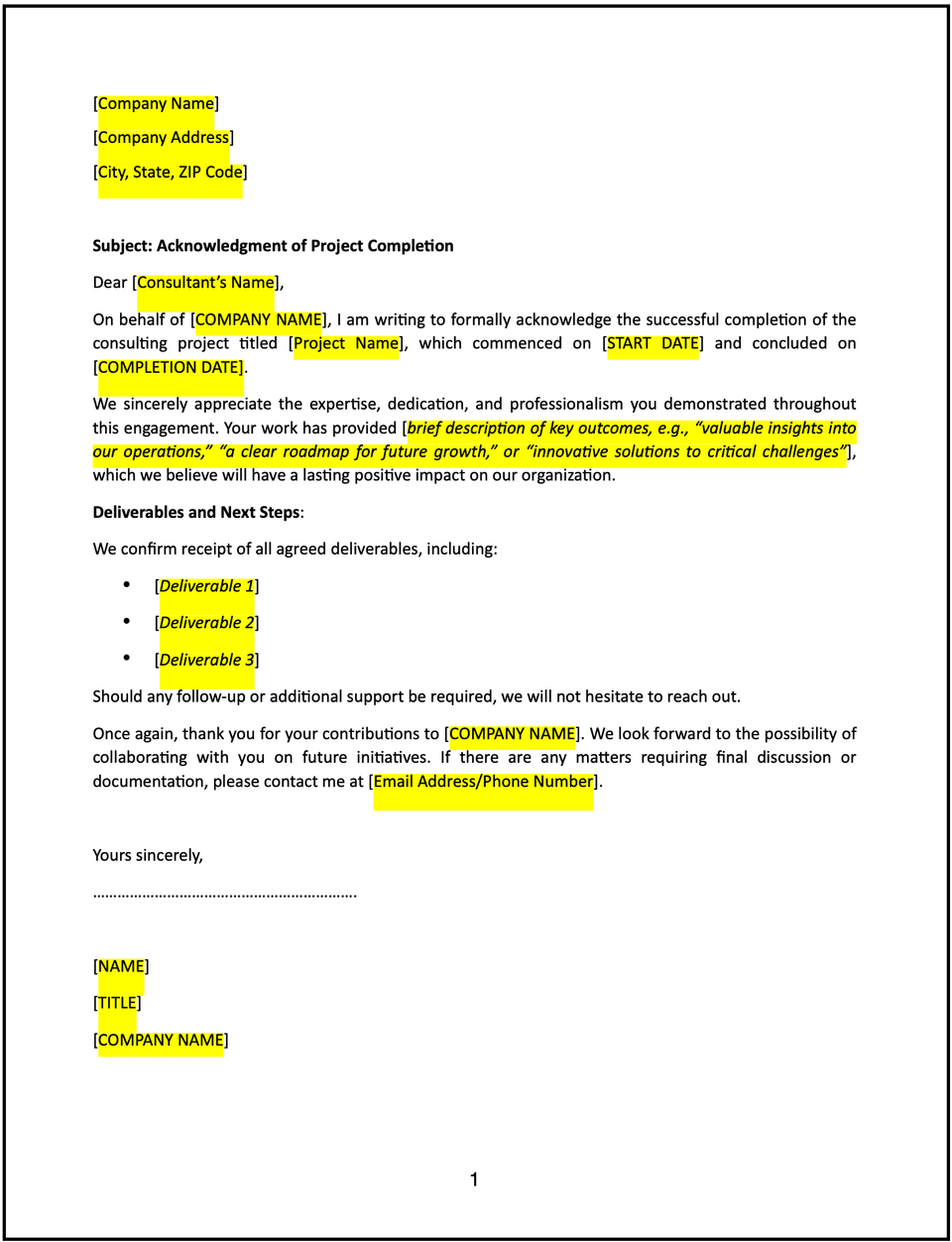Acknowledgment of consulting project completion letter: Free template

Acknowledgment of consulting project completion letter
An acknowledgment of consulting project completion letter is a formal communication used to recognize the successful completion of a consulting project. This letter confirms the completion, expresses gratitude, and highlights the outcomes or milestones achieved, fostering goodwill and a positive relationship.
How to use this acknowledgment of consulting project completion letter
- Open with an introduction: Address the recipient respectfully and refer to the consulting project by name or reference number.
- Confirm completion: Clearly state that the consulting project has been completed, specifying the date of completion.
- Highlight accomplishments: Briefly summarize the key achievements, deliverables, or milestones met during the project.
- Express appreciation: Thank the consulting team or individual for their efforts, professionalism, and contributions to the project’s success.
- Provide next steps: If applicable, outline any follow-up actions, such as final documentation, feedback sessions, or future collaboration opportunities.
- Reiterate gratitude: Emphasize the value of their expertise and the positive impact of the project.
- Maintain a professional tone: Ensure the letter is clear, respectful, and focused on fostering a strong relationship.
- Provide contact information: Include details for any further communication or inquiries.
Benefits of using an acknowledgment of consulting project completion letter
This letter ensures a structured and professional way to recognize project completion while fostering goodwill and collaboration. Here’s how it helps:
- Promotes professionalism: Acknowledging completion demonstrates respect and commitment to effective communication.
- Builds trust: Expressing appreciation fosters a positive and enduring relationship.
- Highlights achievements: Recognizing key outcomes reinforces the value of the consulting effort.
- Encourages future collaboration: Maintaining a respectful tone opens the door for ongoing or future projects.
- Provides closure: Confirming completion ensures all parties are aligned and satisfied with the project’s conclusion.
Tips for writing an effective acknowledgment of consulting project completion letter
- Be specific: Clearly reference the project, its objectives, and its outcomes.
- Use professional language: Maintain a respectful and appreciative tone to foster trust.
- Provide context: Briefly explain the project’s significance and its contribution to organizational goals.
- Highlight mutual benefits: Emphasize how the project’s completion positively impacts all parties involved.
- Include actionable steps: If applicable, outline follow-up actions or future opportunities for collaboration.
- Keep it concise: Focus on the key points while ensuring the tone is professional and engaging.
Frequently asked questions (FAQs)
Q: What details should I include in this letter?
A: Include the project reference, confirmation of completion, key achievements, and any next steps or follow-up actions.
Q: Should I personalize the letter?
A: Yes, addressing the consulting team or individual by name and referencing specific contributions demonstrates attentiveness and professionalism.
Q: Who typically sends this letter?
A: Business leaders, project managers, or organizational representatives overseeing the project typically send this letter.
Q: How formal should this letter be?
A: The tone should be professional and respectful, focusing on fostering goodwill and collaboration.
Q: When should this letter be sent?
A: Send the letter promptly after the project’s completion to ensure timely acknowledgment and appreciation.
Q: Can this letter include feedback on the project?
A: Yes, including constructive feedback or praise for specific aspects of the project adds value to the acknowledgment.
Q: Is acknowledgment from the recipient required?
A: While not mandatory, inviting acknowledgment ensures alignment and satisfaction with the project’s completion.
This article contains general legal information and does not contain legal advice. Cobrief is not a law firm or a substitute for an attorney or law firm. The law is complex and changes often. For legal advice, please ask a lawyer.


